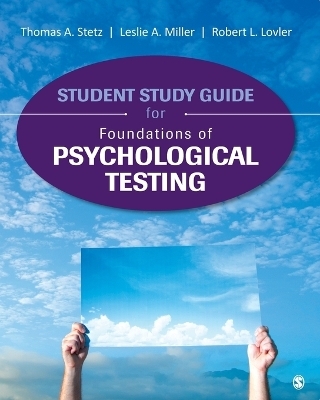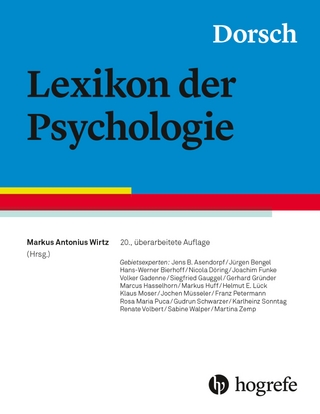
Student Study Guide for Foundations of Psychological Testing
SAGE Publications Inc (Verlag)
978-1-5063-0805-0 (ISBN)
The Student Study Guide for Foundations of Psychological Testing has 15 chapters corresponding to those in the main text and follows a consistent structure for quick and easy access to key information. To help students understand and apply material related to psychological testing, the guide offers overviews, learning objectives, outlines, key concepts, crossword puzzles, tips by learning objective, additional exercises, additional learning activities, practice questions, and answer keys.
Save your students money! Bundle the guide with the main text. Use Bundle ISBN: 978-1-5063-2208-7.
The main text, Foundations of Psychological Testing: A Practical Approach, Fifth Edition, offers a clear introduction to the basics of psychological testing as well as to psychometrics and statistics. The practical book includes discussion of foundational concepts and issues, using real-life examples and situations students will easily recognize, relate to, and find interesting. A variety of pedagogical tools further the conceptual understanding needed for effective use of tests and test scores. Now aligned with the 2014 Standards for Educational and Psychological Testing, the Fifth Edition offers new and expanded content throughout.
Leslie A. Miller, PhD, SHRM-CP, PHR, has broad experience in consulting, teaching, and researching in the area of organizational and educational assessment, measurement, and development. Currently the owner of her own consulting business, LanneM TM, LLC, she provides her clients with pragmatic and affordable talent management solutions to help them acquire, develop, and retain the talent they need to achieve desired business results. Her expertise includes designing performance improvement and management tools and knowledge tests, customizing and facilitating leadership training programs, providing assessment-based executive coaching, and designing and implementing business impact evaluation and return-on-value studies. She also spends her time as an adjunct faculty member teaching organizational behavior and psychology, research, and human resources courses at Rollins College, the University of Oklahoma, and for the School of Advanced Studies at the University of Phoenix. In addition, she chairs doctoral dissertations. Previously the vice president of leadership development and human resources at the Central Florida YMCA, she was responsible for contributing to the strategic plans of the organization by leading the association’s talent management initiatives—recruiting, developing, and retaining the association’s talent. Prior to joining the YMCA, she was employed by Wilson Learning Corporation (WLC), a performance improvement company, where she served as the director of business solutions, a senior project manager, and a business solutions consultant. In these roles, she was responsible for conceptualizing, designing, managing, and implementing traditional and technology-based assessment, measurement, and training performance improvement solutions for client organizations. Prior to joining WLC, Dr. Miller served as the assistant dean of admissions at Rollins College, where she was also a faculty member of the psychology, organizational behavior, and human resources programs. Before joining Rollins College, she was a senior research psychologist for the U.S. Department of Labor, Bureau of Labor Statistics, in Washington, D.C. At the bureau, she designed, researched, and analyzed the results of some of our nation’s most important surveys. In her current and previous roles, she has worked with various leading organizations in the high-tech, financial, pharmaceutical, and transportation industries. The holder of a doctorate in educational psychology from the University of Maryland, she has an extensive list of publications and presentations. She is a member of the APA, the Society for Industrial and Organizational Psychology, and the Society for Human Resource Management. Robert L. Lovler, PhD, has over 30 years of experience working as both an internal and an external consultant to Fortune 500 companies in the areas of employee assessment and selection, organizational development, strategic human resource consulting, and training design and delivery. His career began at CBS Inc., where he served in several roles, including director of training for the retail consumer electronics unit, then moving up to vice president of two different units within the CBS Publishing Group. He is currently senior vice president of global human resources at Wilson Learning Corporation, an international consulting firm that focuses on human performance improvement. During his career, he has had the opportunity to design and implement a wide range of organizational interventions both domestically and internationally, working in Japan, China, South Korea, Hong Kong, England, and Italy. In the United States, he supervised the development and implementation of the assessment center used to select candidates for entry into the Environmental Protection Agency’s (EPA) Senior Executive Service Development Program, presenting the results in Washington, D.C., to Christine Todd Whitman, the EPA administrator. He also developed the system used to help select commercial airline pilots for a major U.S. airline and worked with former senator Warren Rudman to develop and implement a nationwide survey of sales practices in the rent-to-own industry. He has served as a testing consultant to the California Bar Association and the state of Pennsylvania, and he oversaw the development of the licensure examinations for medical physicists in the state of Texas. He has been on the faculty of the State University of New York at Farmingdale, and the adjunct faculty of Hofstra University, and the University of Central Florida. Dr. Lovler received his BA degree in psychology from the University of California, Los Angeles, and holds master’s and doctoral degrees from Hofstra University. He is a member of the APA and the Society for Industrial and Organizational Psychology.
Preface
Chapter 1: What Are Psychological Tests?
Chapter 2: Why Is Psychological Testing Important?
Chapter 3: Is There a Right or Wrong Way to Use Psychological Tests?
Chapter 4: How Does Computerized Testing Work?
Chapter 5: How Do Test Users Interpret Test Scores?
Chapter 6: What Is Test Reliability/Precision?
Chapter 7: How Do We Gather Evidence of Validity Based on the Content of a Test?
Chapter 8: How Do We Gather Evidence of Validity Based on Test–Criterion Relationships?
Chapter 9: How Do We Gather Evidence of Validity Based on a Test’s Relation to Constructs?
Chapter 10: How Do We Construct and Administer Surveys and Use Survey Data?
Chapter 11: How Do We Develop a Test?
Chapter 12: How Do We Assess the Psychometric Quality of a Test?
Chapter 13: How Are Tests Used in Educational Settings?
Chapter 14: How Are Tests Used in Clinical and Counseling Settings?
Chapter 15: How Are Tests Used in Organizational Settings?
| Verlagsort | Thousand Oaks |
|---|---|
| Sprache | englisch |
| Maße | 203 x 254 mm |
| Gewicht | 630 g |
| Themenwelt | Geisteswissenschaften ► Psychologie ► Allgemeines / Lexika |
| Geisteswissenschaften ► Psychologie ► Test in der Psychologie | |
| ISBN-10 | 1-5063-0805-8 / 1506308058 |
| ISBN-13 | 978-1-5063-0805-0 / 9781506308050 |
| Zustand | Neuware |
| Haben Sie eine Frage zum Produkt? |
aus dem Bereich


